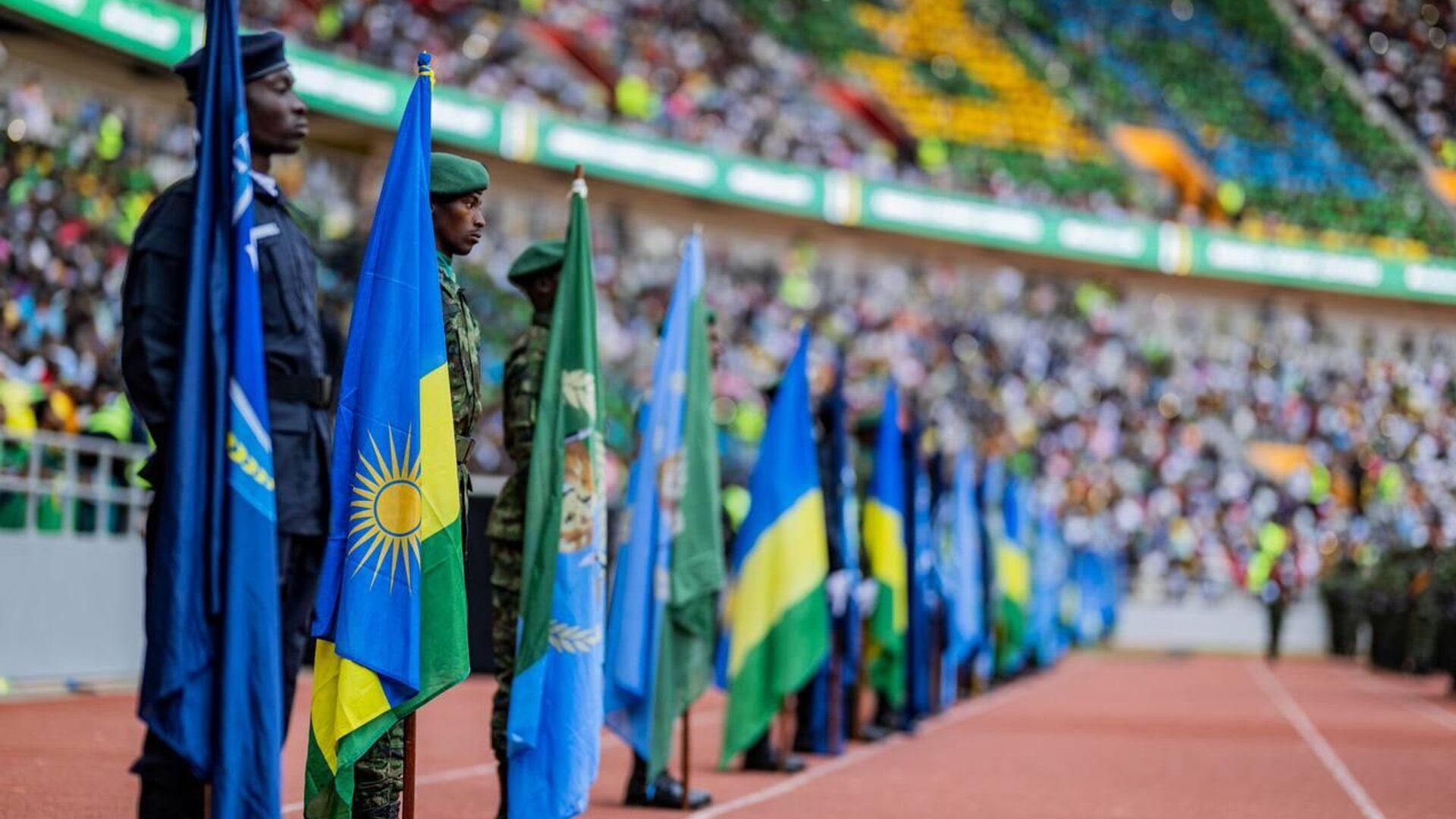https://en.sputniknews.africa/20240706/rwanda-can-be-role-model-of-unity-expert-says-on-30th-anniversary-of-liberation-day-1067399640.html
Rwanda Can Be Role Model of Unity, Expert Says on 30th Anniversary of Liberation Day
Rwanda Can Be Role Model of Unity, Expert Says on 30th Anniversary of Liberation Day
Sputnik Africa
Liberation Day, also known as Kwibohora, is celebrated regularly on July 4. The day commemorates the victory of the Rwandan Patriotic Front (RPF) over the... 06.07.2024, Sputnik Africa
2024-07-06T17:30+0200
2024-07-06T17:30+0200
2024-07-08T16:39+0200
rwanda
east africa
opinion
africa in details
paul kagame
belgium
sputnik africa
genocide
colonialism
victims
https://cdn1.img.sputniknews.africa/img/07e8/07/06/1067402883_0:103:1280:823_1920x0_80_0_0_e00ccf4016bd6ab800d998767473f6fa.jpg
Rwanda's horrific experience of the 1994 genocide and its unique path to healing hatred in a nation can be a "role model" of how differences between ethnic groups can be overcome, Dr. Emmanuel Mushimiyimana, Ph.D. in Political Science, told Sputnik Africa.So what other countries "can learn" from Rwanda is the ability "to reconcile people, but also to establish justice," the expert noted.Mushimiyimana argued that the reason for the Hutu genocide lay in the colonial past and the Belgian rule of Rwanda under the "divide and rule" policy.As a result, "Belgian colonialist agents and the Catholic Church, mostly missionaries, triggered the hate against the Tutsi," he asserted.The German and later Belgian colonial authorities exacerbated internal tensions to maintain power in Rwanda, causing the genocide. Belgium backed the Tutsi monarchy until it compromised with the Hutus. With Belgium's help, Rwanda's population polarized along ethnic lines, and ethnically focused political parties arose, the expert said.After ethnic Hutu Rwandan President Juvenal Habyarimana's plane was shot down by a missile on April 6, 1994, the genocide against the Tutsis broke out under the pretext of Hutu authorities accusing ethnic Tutsis of the president's killing. More than 800,000 individuals were ruthlessly slain in 100 days, according to the estimates. The bulk of casualties were Tutsis; however, Hutus who refused to slaughter their neighbors were also murdered.In July 1994, Rwanda's president, Paul Kagame, formed a coalition administration with Hutus and Tutsis after assuming official control over the country.Since then, Rwanda has embarked on a path of unity and economic development aimed at eradicating poverty.
rwanda
east africa
belgium
Sputnik Africa
feedback@sputniknews.com
+74956456601
MIA „Rossiya Segodnya“
2024
News
en_EN
Sputnik Africa
feedback@sputniknews.com
+74956456601
MIA „Rossiya Segodnya“
Sputnik Africa
feedback@sputniknews.com
+74956456601
MIA „Rossiya Segodnya“
rwanda, east africa, africa in details, paul kagame, belgium, sputnik africa, genocide, colonialism, victims, conflict, politics
rwanda, east africa, africa in details, paul kagame, belgium, sputnik africa, genocide, colonialism, victims, conflict, politics
Rwanda Can Be Role Model of Unity, Expert Says on 30th Anniversary of Liberation Day
17:30 06.07.2024 (Updated: 16:39 08.07.2024) Liberation Day, also known as Kwibohora, is celebrated regularly on July 4. The day commemorates the victory of the Rwandan Patriotic Front (RPF) over the Rwandan Armed Forces and the former Habyarimana dictatorship in the Rwandan Civil War, ending the genocide of the Tutsi people in Rwanda.
Rwanda's horrific experience of the 1994 genocide and its unique path to healing hatred in a nation can be a "role model" of how differences between ethnic groups can be overcome, Dr. Emmanuel Mushimiyimana, Ph.D. in Political Science, told Sputnik Africa.
"Rwanda can be a role model that shows that unity and coexistence can exist between different tribes. That is one of the first rules. The second rule is that we can advocate for regional anti-genocide ideology propaganda so that people can stop propagating their political and economic interests through the blood of people, especially by promoting genocidal ideology," the expert said.
So what other countries "can learn" from Rwanda is the ability "to reconcile people, but also to
establish justice," the expert noted.
"Not just saying people have to reconcile, no, but they also have to be punished. Criminals have to be punished in societies. The culture of impunity should stall, and everybody should be accountable for his or her crimes, in one way or another, but also in a moral way, in conciliatory ways," he explained.
Mushimiyimana argued that the reason for the Hutu genocide lay in the colonial past and the Belgian rule of Rwanda under the "divide and rule" policy.
As a result, "Belgian colonialist agents and the Catholic Church, mostly missionaries, triggered the hate against the Tutsi," he asserted.
The German and later Belgian colonial authorities exacerbated internal tensions to maintain power in Rwanda,
causing the genocide. Belgium backed the Tutsi monarchy until it compromised with the Hutus. With Belgium's help, Rwanda's population polarized along ethnic lines, and ethnically focused political parties arose, the expert said.
After ethnic Hutu Rwandan President Juvenal Habyarimana's plane was shot down by a missile on April 6, 1994, the genocide against the Tutsis broke out under the pretext of Hutu authorities accusing ethnic Tutsis of the president's killing. More than 800,000 individuals were ruthlessly slain in 100 days, according to the estimates. The bulk of casualties were Tutsis; however, Hutus who refused to slaughter their neighbors were also murdered.
In July 1994, Rwanda's president, Paul Kagame, formed a coalition administration with Hutus and Tutsis after assuming official control over the country.
Speaking of the holiday's significance, the researcher argued that the Rwandans celebrate the liberation from Habyarimana regime, "which was considered as dictatorial and also tribal and having all kinds of denial of rights of citizens."
Since then, Rwanda has embarked on a path of unity and economic development aimed at eradicating poverty.
"Rwanda established a policy called Ubudehe, which means public labor, group-based labor, in which everyone has their own category from one to four. I mean, here the first one is the very poor, the second one is the poor, the third one is relatively middle class, and the fourth one is the richest. And those categories matter when we talk about service delivery for the people," Mushimiyimana noted.

